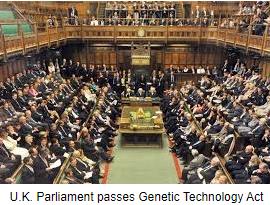 Parliament has passed the Genetic Technology (Precision Breeding) Act followed by royal assent. Approval of bills by the Sovereign is analogous to enactment by presidential signature. In most cases, this final step is a formality. The fact that King Charles III agreed to approve the bill signifies solid support for this technology. King Charles is an avid promoter of organic farming and might have been expected to express his concern over the legislation. The Act applies in England and awaits approval by the devolved legislatures of Scotland, Wales and Northern Ireland.
Parliament has passed the Genetic Technology (Precision Breeding) Act followed by royal assent. Approval of bills by the Sovereign is analogous to enactment by presidential signature. In most cases, this final step is a formality. The fact that King Charles III agreed to approve the bill signifies solid support for this technology. King Charles is an avid promoter of organic farming and might have been expected to express his concern over the legislation. The Act applies in England and awaits approval by the devolved legislatures of Scotland, Wales and Northern Ireland.
The Act allows breeders of crops to apply gene-editing including Crispr-9/CAS9 to develop improved strains of that may withstand pests and drought or provide higher yields. An appropriate science-based regulatory framework will be established to approve and expedite new strains of field crops and vegetables. Application of gene-editing to animals will follow.
 Given the responsibility for the Foods Standards Agency to conducting risk assessments, it is anticipated that gene-edited seeds will be available to farmers within five years.
Given the responsibility for the Foods Standards Agency to conducting risk assessments, it is anticipated that gene-edited seeds will be available to farmers within five years.
Studies on gene-editing of crops have preceded for a few years with major research institutes working on wheat, barley, rice and strawberries. The U. K. Government is proceeding with legislation relating to genetic modification involving the manipulation of genomes including insertions that will extend the scope of precision breeding over the coming two years.
Passage of the Genetic Technology Act has predictably generated opposition from organizations that reject all forms of genetic modification irrespective of scientific justification.